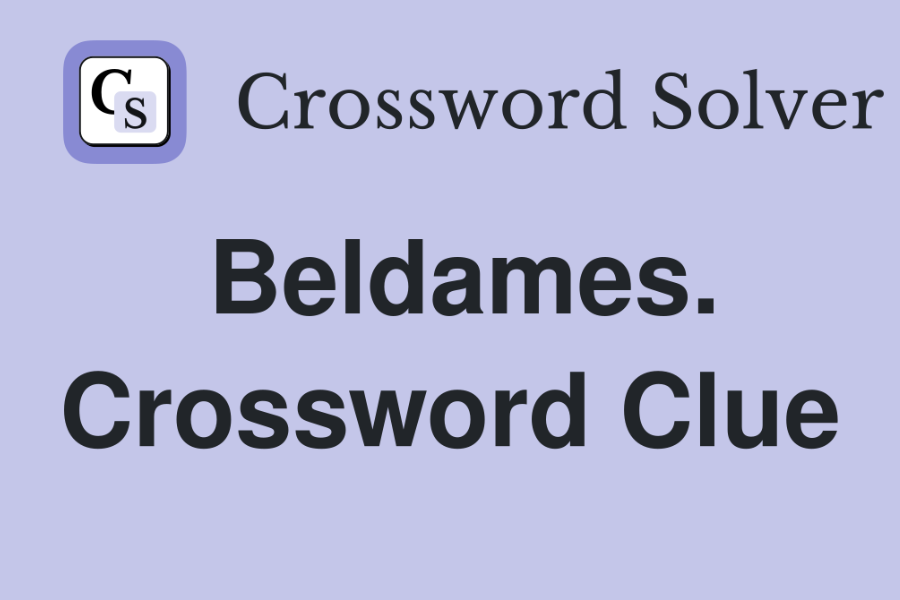Unraveling “Beldames” in Crossword Puzzles
Crossword puzzles frequently test our grasp of vocabulary and obscure terms, and one such term that has appeared in the New York Times crossword is “beldames.” This guide aims to shed light on the meaning, historical background, and literary use of “beldames,” offering you a richer understanding of this fascinating word and aiding in your quest to solve related crossword clues.
Exploring the Term “Beldames” in the NYT Crossword
The term “beldames” is a throwback to a bygone era, occasionally making its way into literary works and puzzles like those in the New York Times. Once a common term, “beldames” is now rarely used but carries intriguing connotations. Originally derived from Middle French, it meant “grandmother” or “old woman.” However, over time, the term’s meaning took on a more negative tone, often referring to elderly women perceived as withered or witch-like.
In historical contexts, “beldames” was used to describe older women who were sometimes thought to possess mystical or supernatural abilities. This reflects the cultural attitudes of past societies, where elderly women were often viewed with suspicion and linked to witchcraft. Understanding these nuances can enrich your experience with crosswords and literature featuring this term.
Beldames in Literature: From Classic to Contemporary
The term “beldames” has intriguing implications when it appears in literature, shedding light on how different eras have perceived older women. Historically, “beldames” often embody a blend of mystery and fear, reflecting societal attitudes towards the elderly.
Classic Literature
In classic works, “beldames” are frequently depicted as enigmatic and somewhat intimidating figures. For example, Shakespeare’s plays sometimes feature elderly women with mystical insights who influence the story through their supposed supernatural powers. These characters are integral to the plot, adding depth and intrigue with their arcane knowledge.
Modern Literary Usage
In contemporary literature, authors may use the term “beldames” to evoke a sense of history or to tap into its old-fashioned connotations. Modern portrayals often blend admiration with apprehension, illustrating the complex roles that these characters play. They are seen as bearers of wisdom and power, reflecting both respect and a hint of the uncanny.
Beldames in Crossword Puzzles: A Guide to Deciphering Clues
In crossword puzzles, the term “beldames” presents a unique challenge that draws on historical and literary knowledge. Recognizing its context can significantly aid in solving these clues.
Typical Clues for “Beldames”
Crossword clues featuring “beldames” often explore themes of witchcraft, age, or myth. Common clues might include:
- “Archaic term for witchy older women”
- “Old women of legend”
- “Elderly women in folklore”
Tips for Solving the Clue
When faced with “beldames” in a crossword, consider related terms that fit the clue’s theme. Think about words connected to age, mysticism, or folklore, and match these with the puzzle’s letter pattern. Understanding the historical and literary background of the term can provide valuable hints for finding the correct answer.
The Cultural Significance of Beldames
The term “Beldames” carries rich cultural meaning that goes beyond its simple definition, touching on historical views about aging, gender, and the supernatural.
Representations in Art and Folklore
In both art and folklore, “beldames” are often shown as figures who command both awe and fear. They symbolize the complex relationship society has with age and wisdom, portraying elderly women as sources of profound knowledge but also as embodiments of the mysterious and uncanny.
Contemporary Perspectives
Though “beldames” is not commonly used today, its impact endures in discussions about how older women are portrayed in media and literature. Modern takes on the term may aim to shift its narrative, focusing on celebrating the wisdom and experience of older women rather than perpetuating images of fear and superstition.
FAQs:
1. What does the term “beldames” mean in the context of the New York Times crossword?
In crossword puzzles, “beldames” refers to an archaic term for elderly women, often depicted in literature and history as being witch-like or haggard. The term comes from Middle French and originally meant “grandmother” or “old woman,” but its connotation shifted over time to describe older women with a somewhat negative or mystical edge.
2. How did the term “beldames” evolve historically?
Originally, “beldames” was used neutrally to denote older women or grandmothers. However, over time, it took on a more negative connotation, often being used to describe elderly women who were perceived as withered or associated with witchcraft and supernatural abilities.
3. What role do “beldames” play in literature?
In literature, especially classic works like those of Shakespeare, “beldames” are often portrayed as enigmatic, mystical figures with significant influence on the plot. They embody a mix of wisdom and fear, reflecting societal attitudes towards aging and the supernatural.
4. How can I solve crossword clues involving “beldames”?
When encountering clues about “beldames,” consider synonyms and related themes such as witchcraft, age, and folklore. Clues might use terms like “witchy older women” or “elderly women in legend.” Understanding the term’s historical and literary background can help in solving these clues.
5. What is the cultural significance of “beldames”?
The term “beldames” reflects historical attitudes towards aging and gender, often portraying older women as both respected for their wisdom and feared for their supposed supernatural abilities. While less common today, discussions about “beldames” continue to influence how older women are depicted in modern media and literature.
Summary:
The term “beldames,” featured in New York Times crossword puzzles, refers to an archaic word for elderly women with a historical and literary significance. Originally meaning “grandmother” or “old woman” in Middle French, “beldames” has evolved to carry a more negative connotation, often linked to witchcraft and the supernatural.
In literature, “beldames” are depicted as mysterious and sometimes fearsome figures, reflecting societal attitudes towards aging and wisdom. Classic literature, such as the works of Shakespeare, often portrays these characters as influential but intimidating. Modern uses of the term might aim to explore or reclaim its historical depth, emphasizing the complex roles of older women.
In crossword puzzles, clues for “beldames” typically relate to themes of witchcraft, old age, or folklore. Understanding its historical and literary background can aid in solving these clues effectively. The term’s cultural legacy continues to influence discussions about the portrayal of older women in contemporary media.
Get the facts first on local and international developments at TribuneIndian.com.




